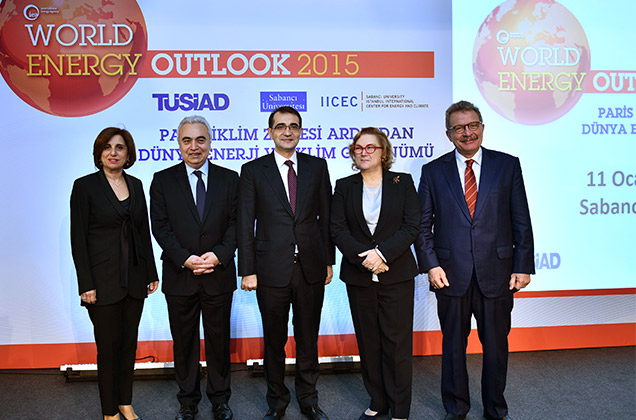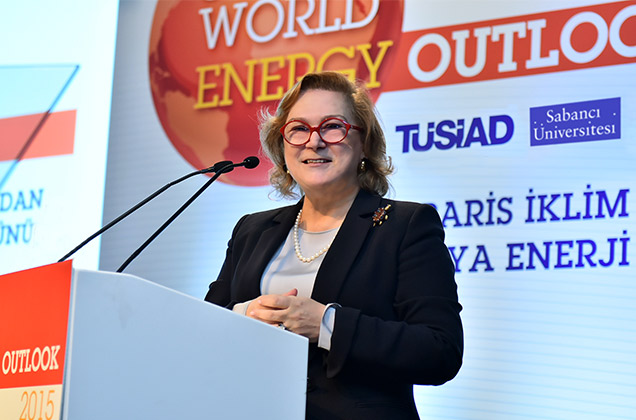13/01/2016
"Improvements made possible by energy technologies may transform the energy industry from being the cause of climate change to its solution."

The "World Energy and Climate Outlook after the Paris Climate Conference" meeting was held. International Energy Agency Executive Director Dr. Fatih Birol presented the World Energy Outlook 2015 report
TÜSİAD and Sabancı University Istanbul International Center for Energy and Climate (IICEC) held a meeting titled "World Energy and Climate Outlook after the Paris Climate Conference."
Introductory remarks of the meeting were delivered by Sabancı University Founding Board of Trustees Chair Güler Sabancı and TÜSİAD Board of Directors Chair Cansen Başaran-Symes.

Güler Sabancı said, "In addition to the breakthrough needed in energy efficiency and renewable energies, improvements made possible by energy technologies may transform the energy industry from being the cause of climate change to its solution. All the countries in the world must work together on the transformation that will ensure sustainability in the energy sector. This is the only way we can leave a sustainable world to future generations.
In distribution, the guidelines for the new tariff for the 2016-2020 were established. Liberalization and free market are indispensable to us. We have had some headway in retail liberalization, albeit not at the desired level. Looking forward, we must quickly take further steps in liberalization and have a fully-functional market that favors the consumer. To do so, we must strengthen our energy markets with better regulatory framework, more competitiveness, transparency and predictability. We must seize the opportunity yielded by excess supply and low energy prices to take bold steps in this direction."
Cansen Başaran-Symes spoke: “Last year, in the launch event for the 'World Energy Outlook 2014' Report, we as TÜSİAD had said that 'we cannot be fooled into indifference by low energy prices; we need to implement regulations to liberalize the energy market and expedite the shift to low-carbon technologies as well as investments in energy efficiency.' Renewable energy sources play a large part in the shift to a low-carbon economy while also providing better security of supply. We have had considerable momentum in utilizing our renewable energy sources recently. If we persist in this direction, I believe there will come a time when all the equipment used can be manufactured in Turkey. The production, employment and export opportunities that equipment manufacturing brings will be a great boost to our economy. Maintainining investment incentives and implementing measures to improve the investment environment will be crucial in accelerating the push towards maximum utilization of Turkey's renewable energy potential.
We are confident that liberal and transparent energy markets will encourage efficient investments and energy efficiency, and we know that such investments will empower our shift to a low-carbon economy. We take every opportunity to advocate coordination between this transformation in the energy sector and a change in our manufacturing industry. This is the only way we can harmonize our growth requirements with our environmental responsibilities."
Following introductory remarks, International Energy Agency Executive Director Dr. Fatih Birol presented the World Energy Outlook 2015 report
Birol said that predictability in the energy sector had never been worse. Fatih Birol explained the four causes of low predictability: "First is the geopolitical situation. There are severe issues in the Middle East, where the world's leading oil producers are located. There are no signs of improvement in the short term. Other producers like Russia have their own problems. The second factor is growth. BRICS nations, which have been the driving force of global growth in the past, are not doing so well. The third cause is the Paris Convention; for the first time in history, all the nations of the world have agreed on a text but one thing remains unknown: will the Convention make meaningful change? Finally, predictability is further crippled by uncertainties regarding low energy prices." Fatih Birol continued, “Uncertainty in energy prices is a huge question. Energy prices dropped for two consecutive years in 2015 and 2016, and this trend will continue. If sanctions against Iran are lifted in 2016, this may drive energy prices further down. Low prices are good for countries that are import-dependent in energy, such as Turkey, but we must not let this go to our head."
Birol explained the two diverging views in petroleum markets: "The first view argues that 30 to 40 dollars is the new norm, while the second view believes that prices will rise again in the near future and bring balance to the market. Personally, I don't think prices will stay in the 30-40 dollar range or lower for long."
Fatih Birol said that the Paris Climate Conference was a good first step that sent important messages to the energy sector.
Renewable energy is not a romantic tale anymore
Arguing that the Paris Conference would increase investments in innovation across the world, Birol said, “In Paris, 20 countries pledged to double their energy research and development investments in the next five years. Investments will reduce the costs of clean energy technologies." Birol continued: "As costs drop, renewable energy investments will increase around the world and two-thirds of this investment will be by developing countries. In the next five years, 6.5 out of every 10 dollars invested in the electricity sector will go to renewable energies. Paris sends an important message to the energy sector; their steps will be carefully monitored. Fifty percent of the plants commissioned worldwide last year were renewable. The other 50% included coal, gas, nuclear and oil power plants. This is statistical proof that renewable energy is no longer a romantic tale but serious business."
"We believe India will take over from China"
Explaining that India would soon replace China as having the largest energy demand, Birol said, "We are at the end of the phase where China dictates the growth in global energy demand. Its growth in energy demand is slowing down. Meanwhile, India took great steps in economy and energy. We see it take center stage in global energy. The greatest demand for coal will originate from India and more ground will be covered in solar energy. They will soon become second only to China in solar energy."
Demand for coal in China is at its peak. Demand is faltering in the EU and United States. Demand is on the rise in India and East Asia. There is significant decline in demands worldwide. Developed nations consume less energy. The economy reached a saturation point. Energy is being used more efficiently. We are at the end of a long energy story with China.
The economy and energy demand in China are almost parallel. Energy demand is slowing down. The Chinese government resolved to balance the economy. Much is being done for changing into a liberal economy. Demand is declining in China. There are great efforts for energy efficiency. The investment in renewable energies in China is equal to the investments of all the other nations of the world combined. The motive behind this is climate change and severe air pollution in the cities.
India took great steps in economy and energy as well. They also assisted in reaching a fairer agreement in Paris. 240 million people still live with no access to power. India's population will exceed that of China in 10 years. India has the largest share of the demand in coal. The largest share of petroleum demand is theirs as well. The country is taking great steps in solar energy.


